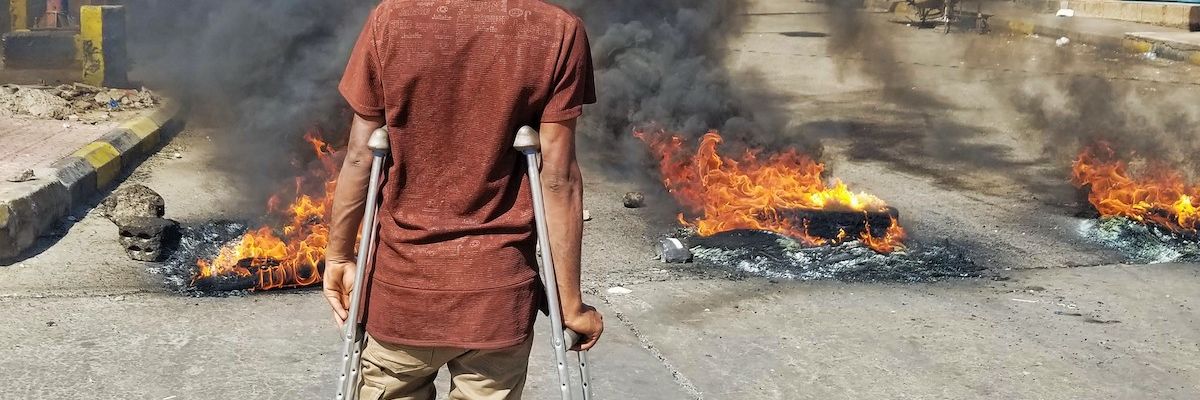Biden pledged to end American support for offensive operations in Yemen, including relevant arms sales, during his first foreign policy speech as president. Yet almost eight months later, the U.S. continues to enable the Saudi war on Yemen, primarily by keeping the Saudi air force aloft. Without U.S. maintenance and spare parts, the Saudis would be unable to conduct air raids on Yemen. In this year alone, the Saudis have run 866 raids, amounting to a total of 23,470 air raids during the war thus far.
Airstrikes have killed or injured at least 18,616 Yemeni civilians since 2015. When airstrikes hit key infrastructure, they also killed over 200,000 Yemeni civilians by depriving them of food, water, and health care. The Saudi tactic of blockading fuel imports from entering Yemen has increased the scale of famine. In early 2021, the UN anticipated that 400,000 children under age five would die of starvation this year. At present, the UN characterizes over 20 million Yemenis as needing humanitarian assistance, and over 12 million as experiencing acute need. The UN considers Yemen the world’s “worst humanitarian crisis.” While many factors contribute to Yemenis’ misery, food insecurity is most severe in areas most impacted by violence.
The Saudi air force has imposed a no-fly zone over Sana’a International Airport since first bombing it in 2015. As a result, 32,000 critically ill Yemenis have been stranded in the capital region, unable to travel abroad to seek treatment. By withdrawing maintenance support for the Saudi air force, the U.S. would allow the Sana’a International Airport to re-open.
Despite years of bombardment, the Saudis have failed to prevent the Houthis, or Ansar Allah, from seizing and holding territory. The Saudi war has instead only empowered the Houthis by imbuing them with the legitimacy of resisting foreign aggression. The longer the U.S. continues to back the Saudis, the longer the war will drag on.
In 2019, Congress acted on a decisive bipartisan basis to constrain U.S. support for the Saudi war, which was only stopped by Trump’s veto. Biden’s initial commitment to diplomacy heartened many who have long worked to foster peace in Yemen. Yet after eight months of effort by Special Envoy Tim Lenderking, early hopes that the U.S. might be able to help move the parties towards resolution have faded. While the United States cannot force Yemen’s warring parties to the negotiating table, Congress can end U.S. complicity in the Saudi onslaught. Deprived of critical U.S. support, the Saudis will have to re-evaluate their approach to Yemen.
This week, several amendments have been proposed to the NDAA regarding U.S. involvement. Of these, the amendment most likely to effectively constrain the Saudis is co-sponsored by Representatives Ro Khanna, Pramila Jayapal, Adam Schiff, Adam Smith, Peter DeFazio, Katie Porter, and Peter Welch. Their amendment “terminates U.S. military logistical support, and the transfer of spare parts to Saudi warplanes conducting aerial strikes against the Houthis in Yemen and permanently ends intelligence sharing that enables offensive strikes.” Unlike more limited and conditional restrictions on aid to the Saudis such as those laid out in the Yemen-related amendment by Representative Gregory Meeks, the Khanna amendment would immediately and decisively end U.S. support for the war.
Congressional action is imperative because the Biden administration has made clear that it will not prevent Saudi violence. The frequency of Saudi airstrikes on Yemen under Biden has been consistent with the last year of the Trump administration. Although initially pausing the sale of U.S. weapons to Saudi Arabia, the Biden administration just announced its first military deal with the Saudis: a $500 million contract for the U.S. to maintain Black Hawk and Apache attack helicopters. This violates Biden’s stated commitment to end support for offensive operations, and the Biden administration has never publicly clarified exactly how it would define such operations, despite multiple requests from Congress to do so.
Congress must summon the same determination they showed in 2019 to end U.S. entanglement in this devastating war.
















